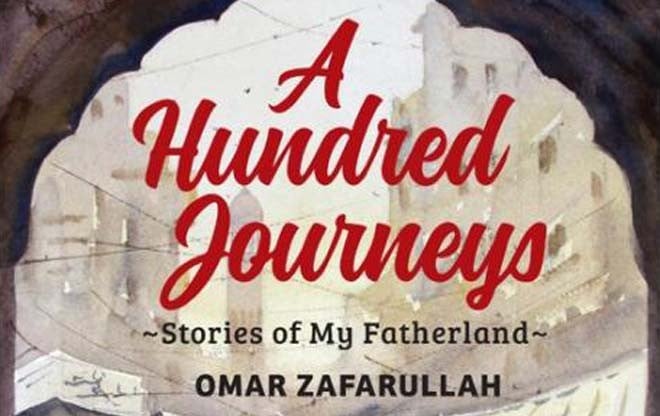
A father’s conversations with his son, immortalised in a series of essays

Family knows us best. Perhaps the reason why the way your daughter wrinkles her nose seems so familiar is because that’s what you remember your father doing. Sometimes we’ll hear our parents’ words escape our lips that we swore we’d never say. To know your family is to know yourself. To know their history is to know your history.
It is this very lesson that Omar Zafarullah wishes to imbibe in his son, Hyder. A Hundred Journeys is a memoir of the Rehmatullah family, addressed to the author’s son. Many fathers will have these conversations with their sons or daughters over the course of their time together. Zafarullah goes a step further to immortalise these for Hyder in a series of essays. He holds his hand as he reminisces, the reader bearing witness to a stroll down memory lane.
More interpretation than narration, A Hundred Journeys is organised into five sections; policy; family; a hundred journeys; war by any other name; trust me. Each mounts the twin pillars of memory and manual. Zafarullah wants his son to be well-acquainted with his past, but he wants him to be even better prepared for a future in Pakistan. And so, he charts out instructions on everything - from how to survive a kidnapping, to whom to call if he fails to follow his ‘six steps’ to even how to interpret the wily ways of a grocer dealing in apricots from Balochistan in America. He teaches him the Japanese art of problem solving ‘Kaezan’. Lucky for Hyder, we also get a preview of the Birds and Bees conversation that he is yet to receive.
There is obvious pride that Zafarullah takes in his family history, one that is peppered with obstacles overcome, characterised by admiration. There is Maaji, the matriarch whom he credits for lifting his family out of poverty. An exam runs over for Zafarullah’s great-great grandfather in his school that sits at a fair distance from his home. Having missed the last bus home, he panics. Just as he begins balking at the idea of having to spend the night at his school, he looks up to find his mother - roti with gur shakar in tow - who has hitched a ride on the back of a gypsy’s cart. Together they find a place to sleep in the school veranda.
This, we find as A Hundred Journeys unfolds is something Zafarullah holds in high regard. Good parenting requires preparing your children for rejection, for plans going awry, for not always getting what you had been working towards, for having problems that are bigger than you. He demonstrates these lessons to Hyder with examples from his own life.
Zafarullah might have been a Yale graduate (and make no mistake, he will not let you forget it in the book), but he is no stranger to failure. His transcription business, born of a nascent internet age and a eureka moment in a hospital, does not survive the 2001 American invasion of Afghanistan. His friends and him disagree over "naming the Taliban." He even fails to convince a prospective wife of his religious devotion (who in a charming anecdote tells him she will ask God for guidance by afternoon prayers - Zafarullah could expect a prompt delivery of His response by the evening prayer).
The political through the person is revealed to us by Zafarullah placing his lens over his son’s eyes as he will cast an eye towards a country that refuses to make sense.
By addressing this collection to his son, what perhaps comes naturally to Zafarullah is an inherent protectiveness. Clearly, he wants to prepare his son for what’s to come. But as outsiders peak into this world, one cannot help but notice that Zafarullah is withholding.
"You are cousins. Brothers. When you enter the house of a brother you must never open the door with your hand. You must kick it open with your leg", says the writer’s Taya (uncle) Latif. As readers, we are given trailers of Zafarullah’s journeys. We are only momentarily welcome, as Zafarullah jumps from one anecdote, one life lesson to the next. There is an abruptness to his chronicles -- as if, we as readers, must not kick the door open but politely knock. Ask if we have gone a step too far, but before we can, Zafarullah at times closes the door on us anyway.
This is not to say that the stories he shares of his journeys are not intimate. Zafarullah takes us into a moment that without doubt, must have been difficult to write. The fatal car crash that led to the death of his father is devastating to read, particularly as he sandwiches the narration between reminding his son of how influential his father has been for him and how difficult it is for Zafarullah to speak of him.
"I write because I need you to know what I cannot say," Zafarullah tells his son. The author’s greatest gift to his son is not this book. It is a quiet acceptance of an axiom he himself mentions, that "people change their opinion only if they need you or if they are afraid of you." He tells Hyder these stories without imposing his morals onto him. He gently guides Hyder and leaves his ultimate choices to him.
As a father, this is the best he can do.